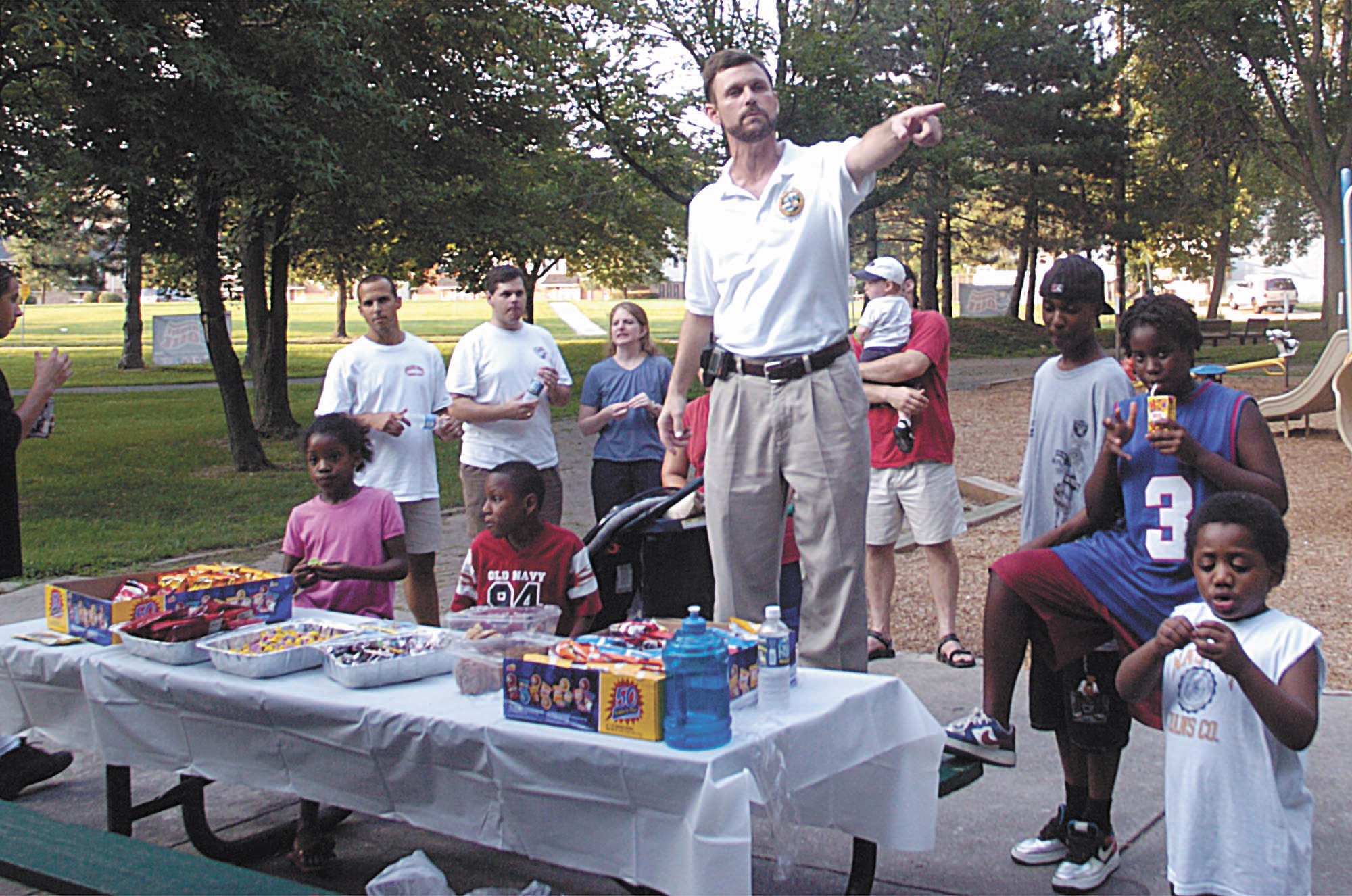
Lakeland Park
Event at Lakeland Park Standing in a white shirt center is Mayor, Stephen Brayman

Event at Lakeland Park Standing in a white shirt center is Mayor, Stephen Brayman

The University at Buffalo expected and received a massive crowd for its debut game for Coach Turner Gill. Past games set the standard for this game's crowd. Though very pleased with the crowd turn-out, concerns didn't disappear from their minds about the defensive line. But in a show of unity, the team wears the same attire to the game. They come out hand-in-hand from the tunnel with uniforms in a show of strength.
Lakeland High School Class of 1950 alumni meeting, 8/28/2004

Pages From History of First Baptist Church of College Park 1890-2005
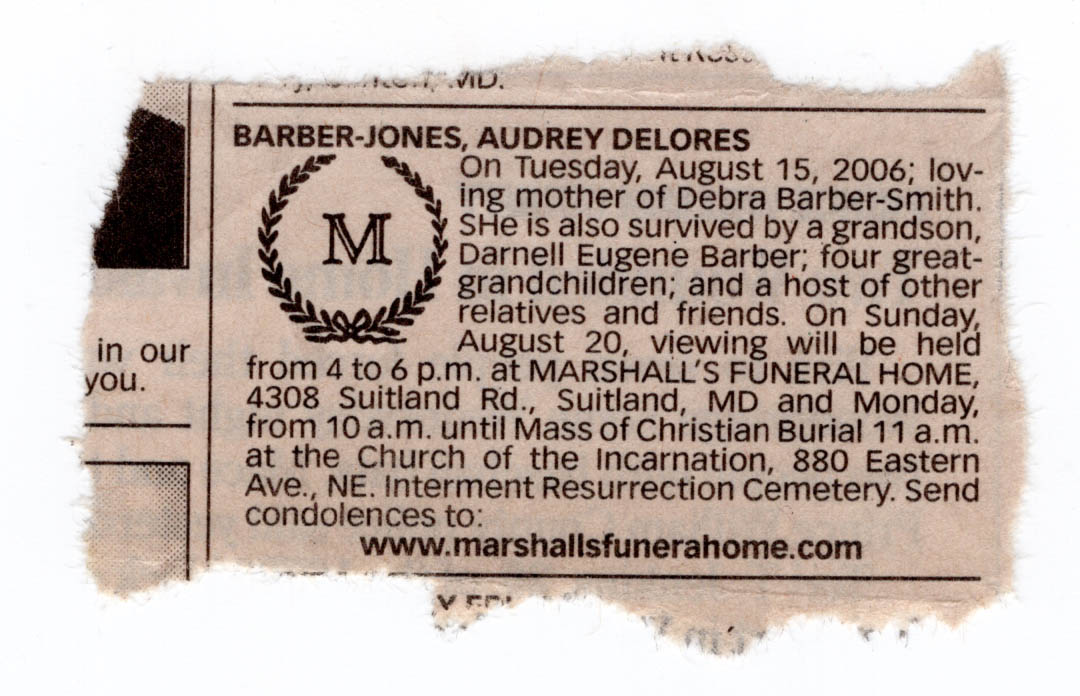
Audrey Delores Barber-Jones passed on Tuesday, August 15, 2006. In her passing, she left behind beloved family and friends. Details of her service are included in the clipping.
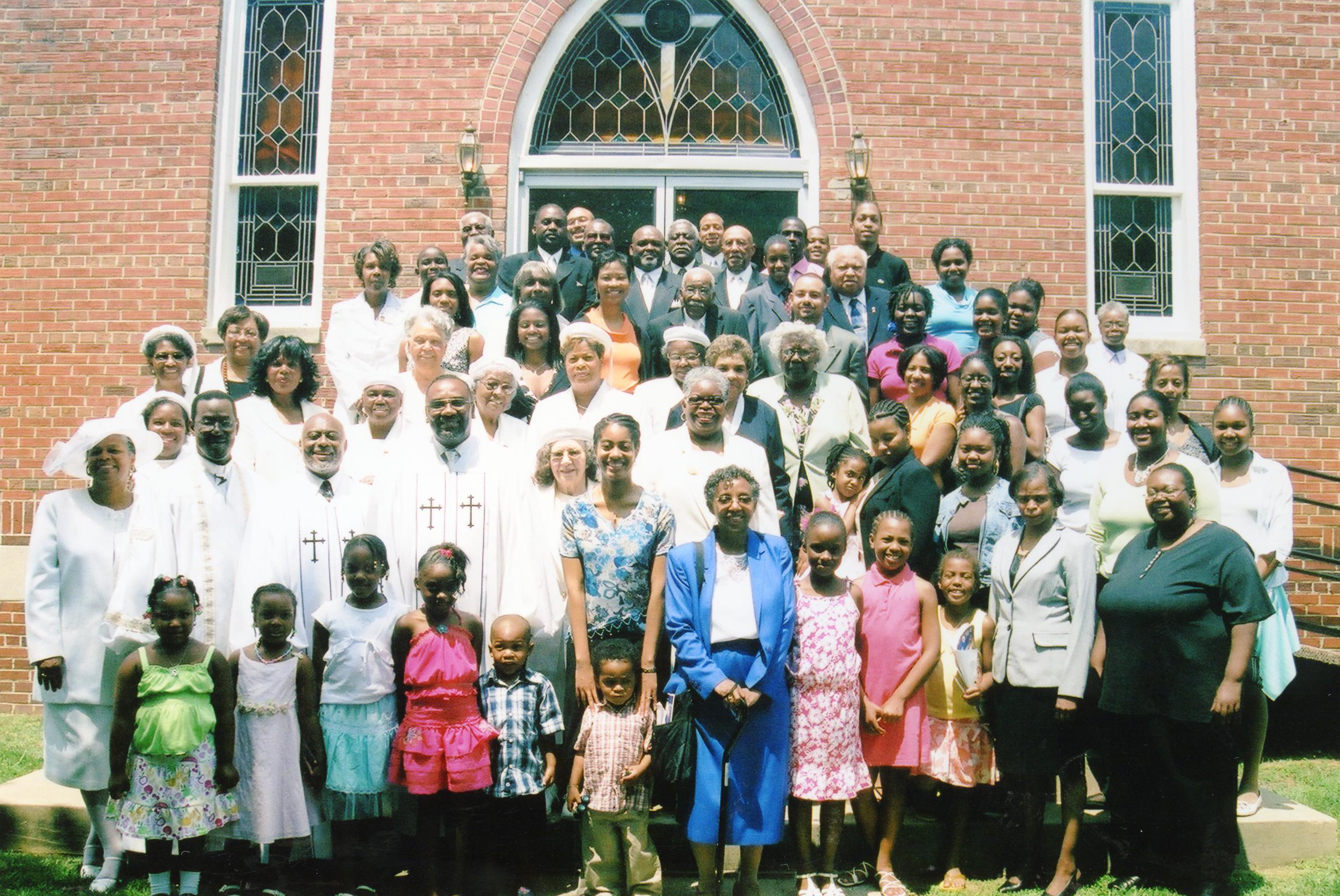
The congregation of the First Baptist Church of College Park gathered for this photograph in June 2006, during the celebration of their 116th year anniversary. Their pastor, Rev. Stephen L. Wright Sr., is second from the left in the second row. His wife, Linda, is to his left. (Courtesy of Eleanor V. Holt)

In First Baptist Church of College Park
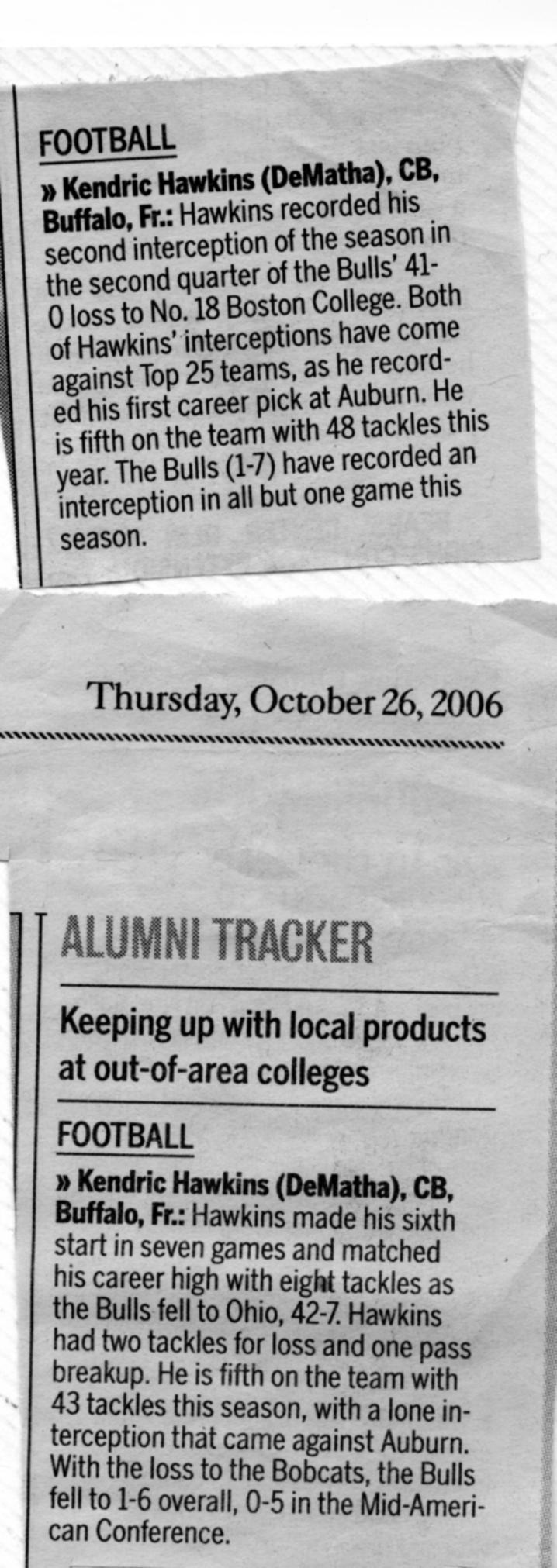
Keeping up with local products at out of town colleges Kendrick Hawkins of Damatha Football
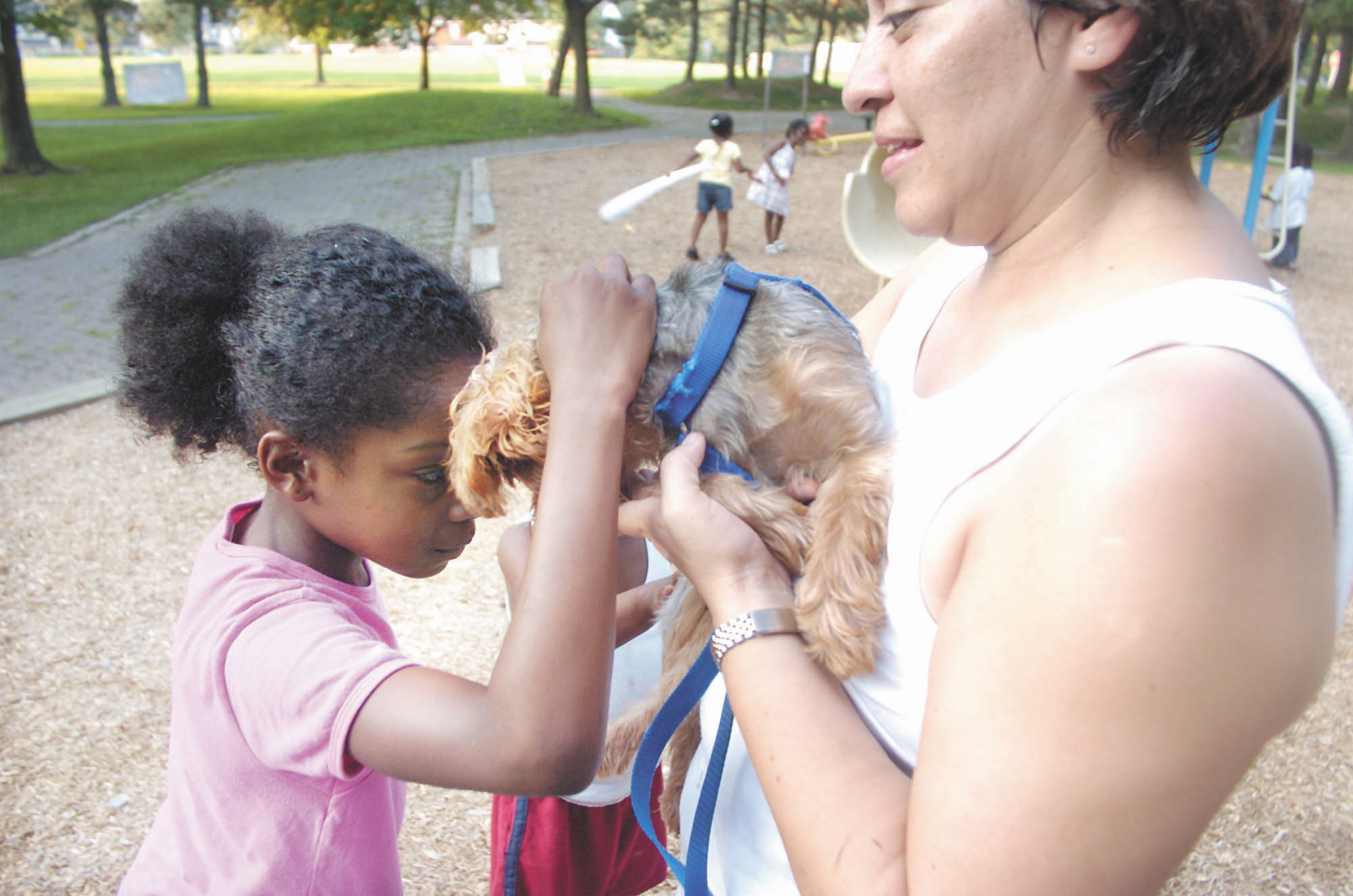
Woman holding dog with young. Girl petting dog in Lakeland Park.
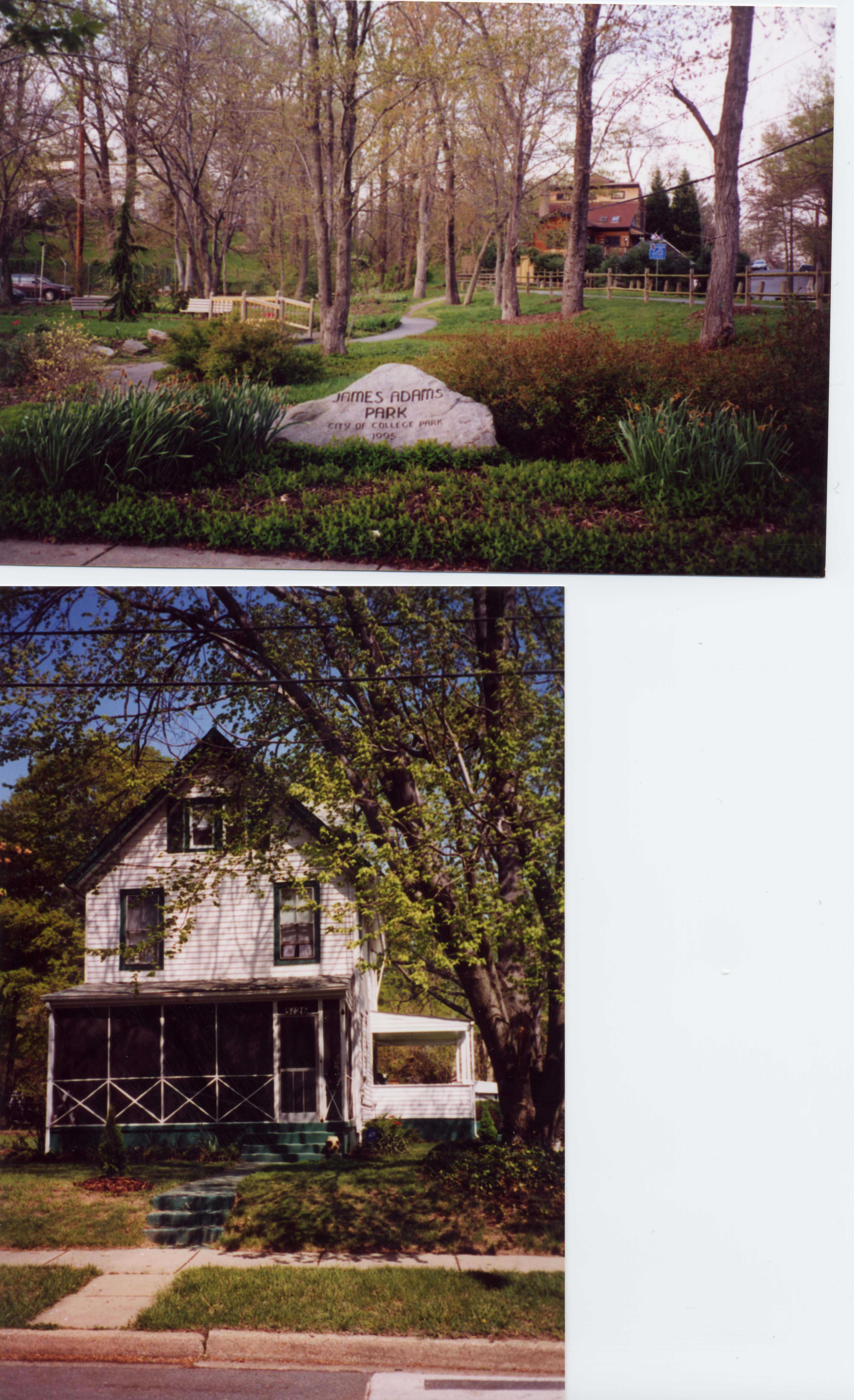
Top image is James Adams Park below is the Randall Home on Navahoe Street

After redevelopment as a public Natural Area
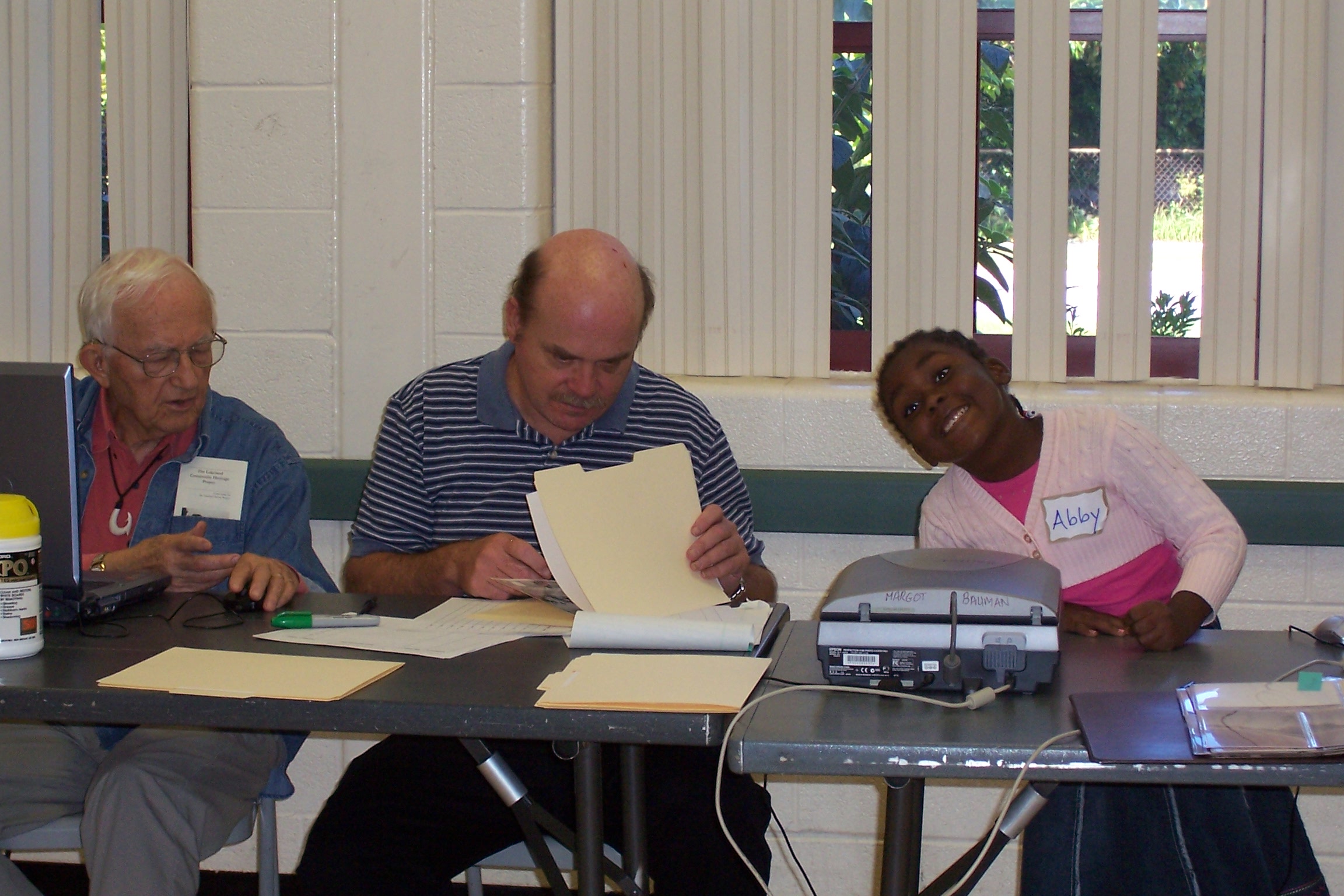
During first collections event for Lakeland Digital Archive. Location was College Park Community Center volunteers seen are Dr. Forrest Tyler, Bob Catlin and Abigail Cohen
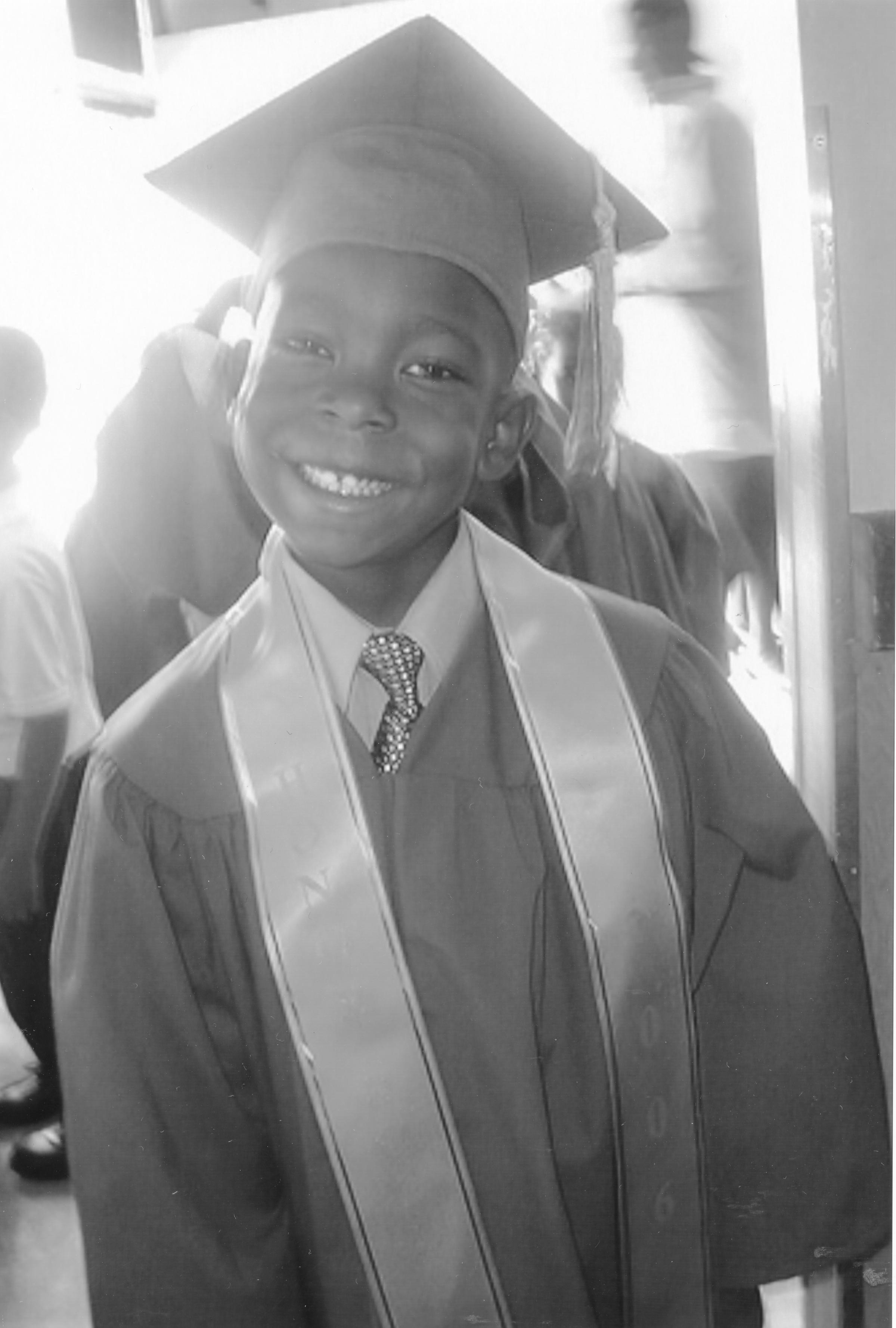
Kindergarten Graduate
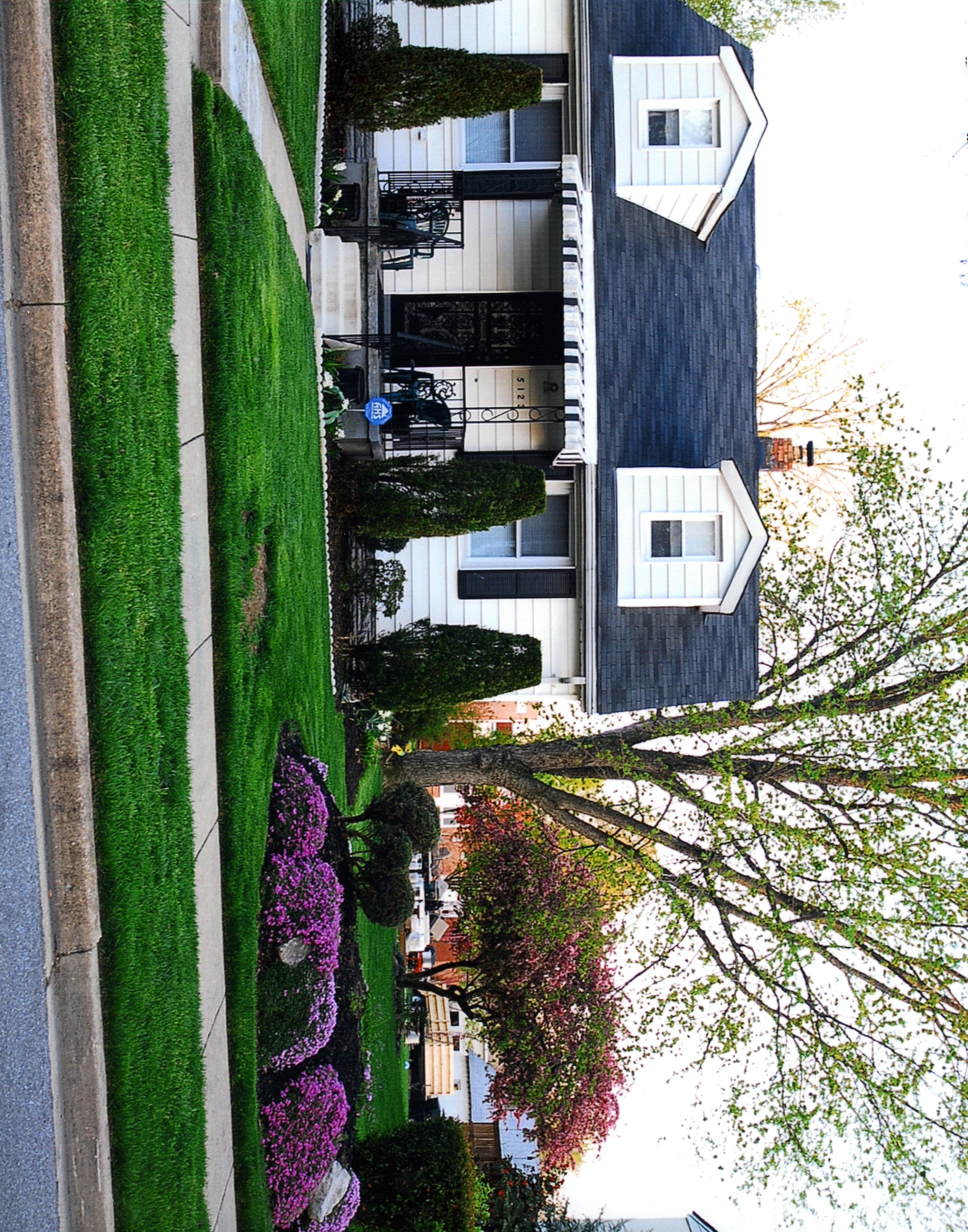
On Navahoe Street

Members of dance group in First Baptist Church of College Park
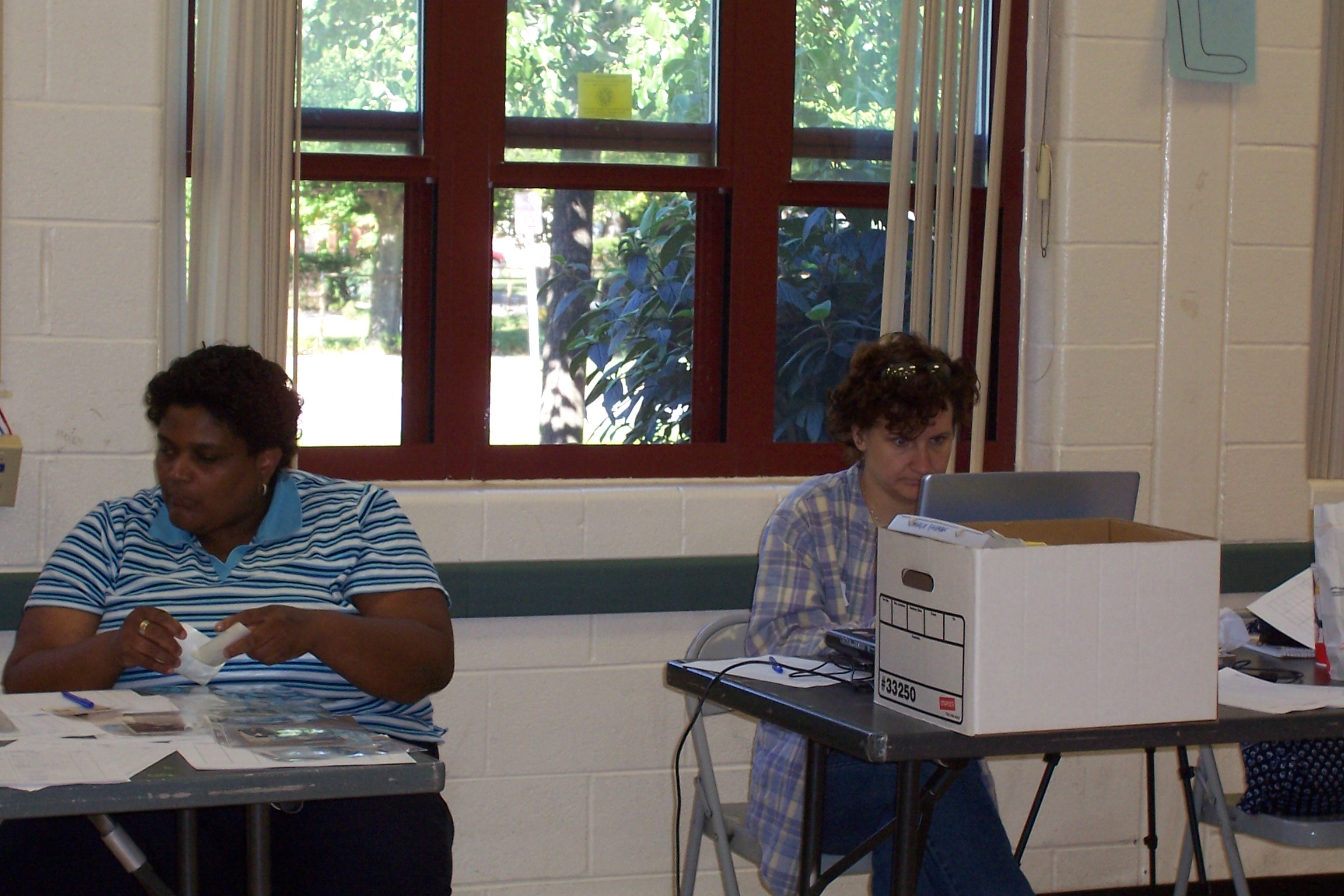
Volunteers at collections event at College Park Community Center Maggie Johnson is left with unknown other volunteer

Members of the congregation of the First Baptist Church of College Park gathered for this photograph in June 2006, during the celebration of their 116th anniversary. Their pastor, Rev. Stephen L. Wright Sr., is second from the left in the second row. His wife, Linda, is to his left.
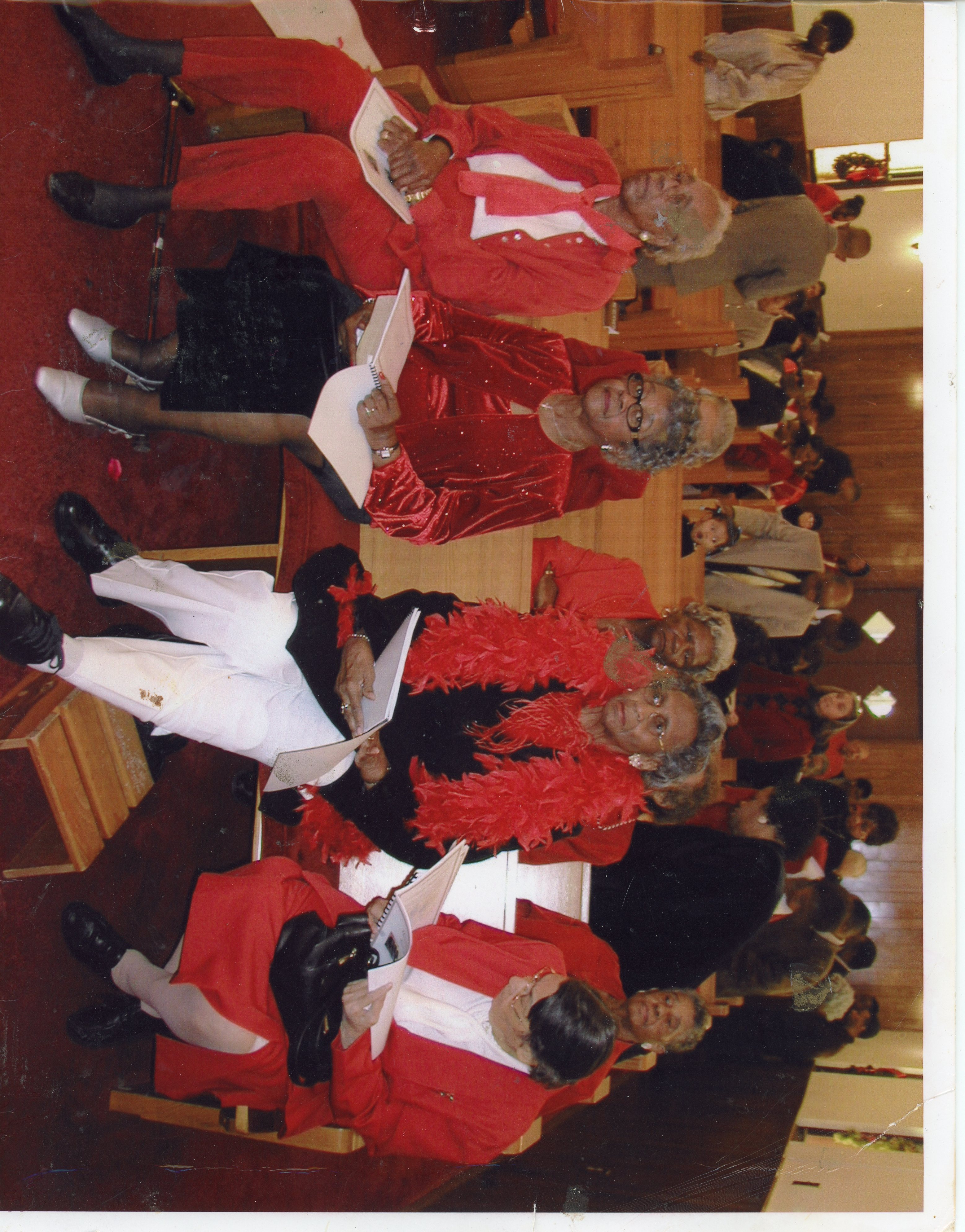
At Embry AME Church front left to right are Dorothy Tolson, Elizabeth Adams, , Agnes Randall , unknown, Fannie Douglas behind them are Audrey Smith and Elizabeth Aires who is locked from view are Mary Day Hollomand and Saxoline Campbell
Recorded in Sandy Tyler's Home in Berwyn. Ms. Tyler is the founding secretary of Lakeland Community Heritage Project
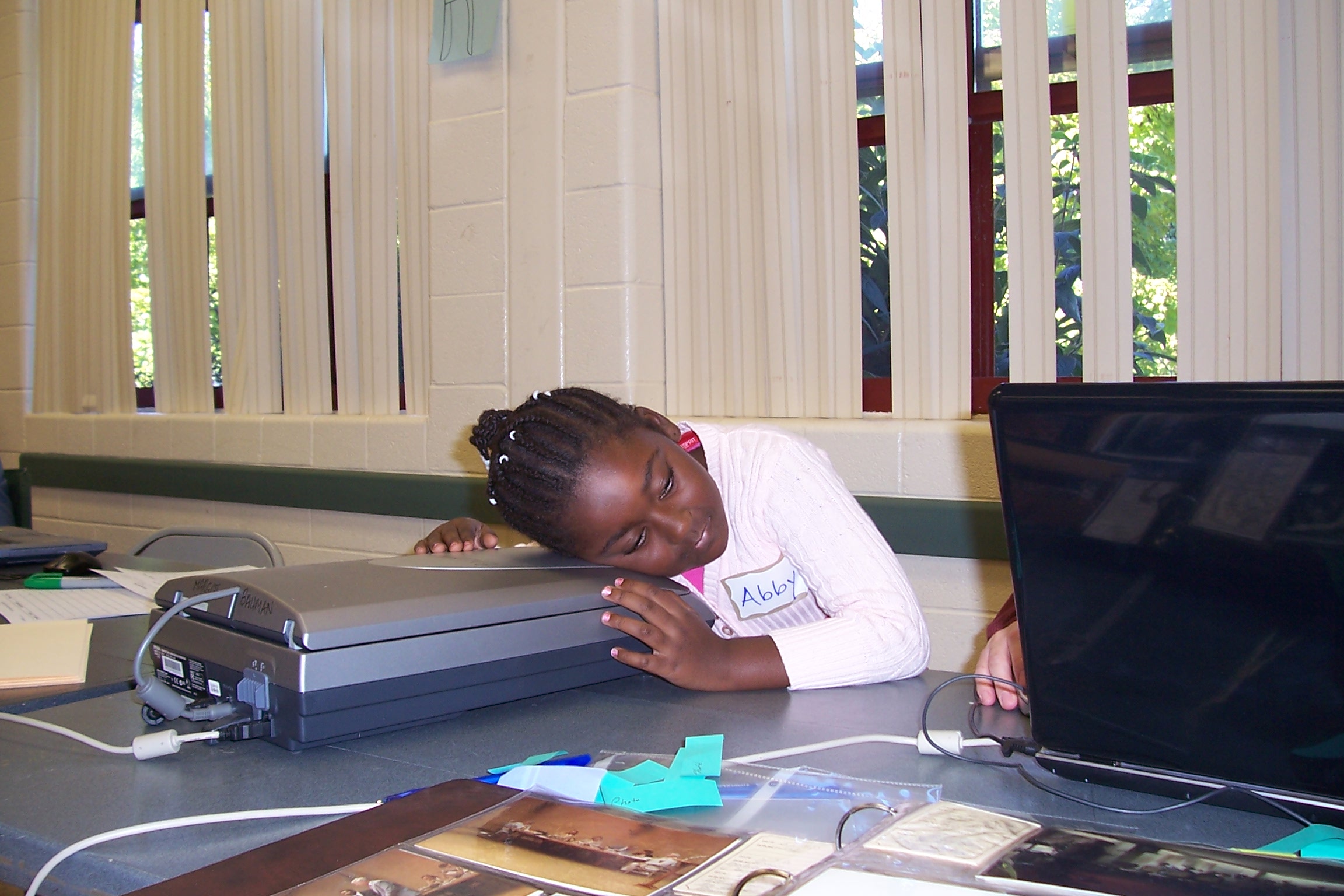
Abigail Cohen at community digitization event. This littlest volunteer helps with scanning.
An oral history interview conducted with Betty Greene during Lakeland Heritage Weekend 2007. Betty Louise Thomas Greene was born on September 13, 1938 at Freedman’s Hospital in Washington D.C. to Annie Venerva Hebron Thomas and Sam (probably Samuel) E. (possibly Edward) Thomas. Betty, the last of eight children, was born when her mother was in her 50s. Betty married her husband, Ambrose Augustine Greene, on June 29, 1957 at Holy Redeemer Church in College Park, Maryland, after he left the Army. Betty and Ambrose both lived in Lakeland, and developed their relationship by going to weekend dances at the Lakeland Tavern. They had one daughter, Danita Darcel Greene Costley. Betty also has two grandsons and three great grandchildren, whom she enjoys visiting in Arlington, Virginia as often as possible. Betty belonged to several community organizations, including the House of Ruth and the Lakeland Civic Association, and is a charter member of Post 140 John Henry Seaburn, College Park (which merged with the American Legion Auxiliary, Post 275, Glenarden.) She is a proud lifelong member of the Embry A.M.E. Church in Lakeland, which was her parents’ church and where she was baptized as an infant. Betty has fond memories of growing up as a child in Lakeland, emphasizing that while her family did not have much, they were very loving towards one another, and belonged to a community where everyone looked out for each other. The children would generally create their own entertainment by “playing store” and “playing house.” They even emulated the behavior of adults and once had a funeral for a dead bird. Betty and her siblings would also collect discarded glass soda bottles and redeem them for penny candy. They would either walk up the tracks to Berwyn, or patronize Mack’s Store or Black’s Store in Lakeland. Her father worked for a coal and feed business in Berwyn. He did the weekly grocery shopping on Saturday, which was payday; the family could look forward to hot dogs and beans for dinner, and as a special treat for the kids, a box of animal crackers. Betty’s mother, a domestic worker for families in Berwyn, knew how to be creative with food, so the family never went hungry. Betty also recalled that her mother got the best hand-me-down clothes from her employers for her children. Betty explained that there was no lack of discipline in her childhood, and that her parents used a switch to discipline their children. Rather than feeling like it was unnecessary, Betty feels that she’s a better person for having been disciplined, though she does hope that parents have learned other methods of disciplining their children. She also recalls being disciplined by her teacher, Richard Brown, by having her hand smacked with a ruler, while attending school in the two-room schoolhouse in east Lakeland. Betty expressed her disappointment over urban renewal in Lakeland because the program did not live up to the expectations that had been promised. The community did need some subsidized housing, but she notes that most of the apartments and lower income houses that replaced single-family houses and small businesses have become student housing; investors are buying homes for sale in the community and renting to students. She feels that this is a disadvantage for the community. Drugs are a problem in Lakeland now, and Betty attributes this to the fact that young people do not want to work at a minimum wage job, and turn down their noses at manual labor. Betty describes her family’s various housing situations. As a child, Betty lived at 5407 Detroit Avenue, now the site of Lake Artemesia (she mentions that she could walk over to Lake Artemesia today but would not be able to locate where her house had been.) They shared a double house with the Stewart family, renting it from the Kleiner family. Betty’s mother eventually went to live with Betty’s sister in Laurel. After Betty and Ambrose married in 1957, they moved in with Ambrose’s grandmother Elizabeth Greene, whose house was located, along with the houses of the Gray and Gross family, on the current location of Paint Branch Elementary School. After some moving around, including a stay in an apartment on Emerson Street in Hyattsville, Betty and Ambrose settled in a house owned by Ambrose’s mother, at 8001 51st Avenue, where Betty lives today. She raised not only her daughter, but also her brother’s four children, in this home. She cites raising her family while working for twenty-seven years as a cleaner at the Paint Branch Elementary School as her proudest personal accomplishment. Betty’s greatest joy in life comes from her involvement in the church. She has served in practically every capacity and church office, and still participates in church activities and charity events, like feeding the homeless. Her love of God and her faith have sustained her through some difficult times in her life, including the tragic loss of her mother in a house fire, a devastating blow for Betty since her mother had a significant influence on her life. To this day, Betty thanks her mother for all the wisdom she imparted, even if Betty did not appreciate the advice at the time. Wrapping up the interview, Betty recalls that she and her siblings looked forward to church, since it was their time to get away from the house. But, their mother’s wild and joyous behavior at church would embarrass them. With a knowing glance, Betty’s mother told her that one day, she would understand. Betty now finds herself acting just like her mother in church. And she couldn’t be happier.
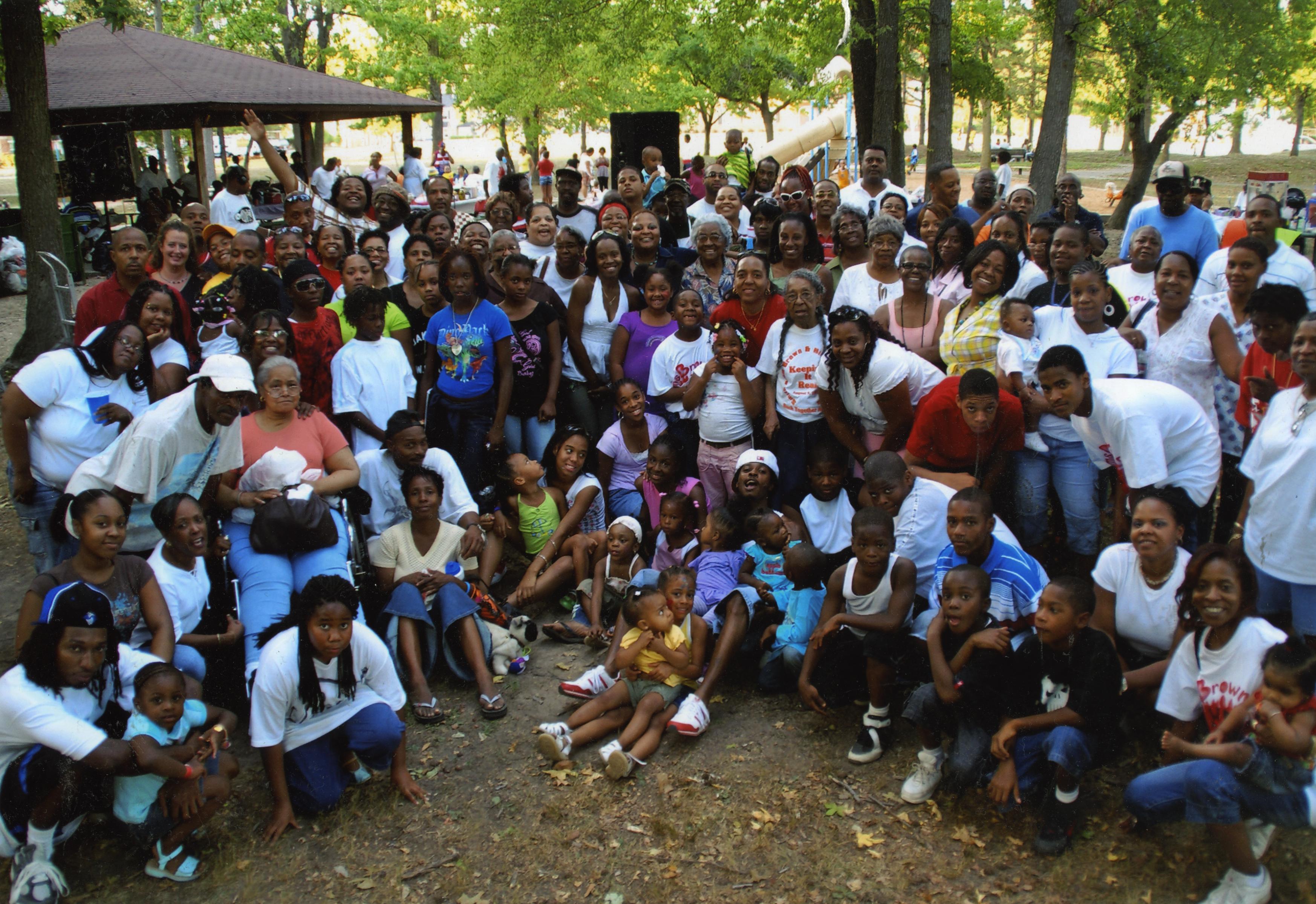
The 2007 Smith family reunion was held in Lakeland Community Park, as it is every other year. In alternate years, the family reunion is held in Pittsburgh, Pennsylvania. Several members of the family continue to live in Lakeland, and many others still consider Lakeland their home. Family members traveled from as far as Texas to attend the 2007 reunion. (Courtesy of Julia Pitts.)
An oral history interview conducted with Clarice Briscoe during Lakeland Heritage Weekend 2007. Both on Omeka and on the hard drive from Mary Sies in the 'LCHP-II, Jan 2011 > 15September_audio' folder. The interviewer does not state her name on the audio, and there is no date given. Split across two audio files: brisco_1.mp3 (25:05) and brisco_2.mp3 (5:30)
A series of interviews with organizers and volunteers by Dinah Winnick and Eli Pousson during Lakeland Heritage Weekend.
An oral history interview conducted with Thelma Lomax during Lakeland Heritage Weekend 2007. In this oral history, former first lady of College Park Thelma Lomax discusses her community involvement with Lakeland from the early 1950s to the present. Thelma Lipsey Lomax married into the Lakeland community in 1953. Her husband, Dervey Lomax, was a Lakeland native, city councilmen and the first African American mayor of College Park. During this interview Mrs. Lomax touches on her life and experiences in the community. Early life family and community life, segregation, urban renewal and even Maryland basketball are all points of discussion during this interview, Mrs. Lomax's connection and commitment to her family, church and community are thoroughly described.
An oral history interview conducted with Jean Ann Matthews during Lakeland Heritage Weekend 2007. Mrs. Jean Ann Gray Matthews, eldest of 13 children, was born in the Lakeland Community in her grandmother's home on December 19, 1934, to Clarence and Christine Gray. In 1954, she married Carroll Matthews in Lakeland at 48th Avenue, which was where her parents resided. From this union, they became the parents of two daughters, Carroll and Avis and two sons, Barrett and Jean. One of the most significant influences that remains in Mrs. Matthews' life is her religious involvement, and she has been a member of the Embry AME Church of Lakeland since a child; she readily admits that these religious teachings, along with her strong familial bond, have instilled in her a positive attitude and a major source of strength. Mrs. Matthews is grateful for the significant role her parents and other religious leaders, such as pastors and Sunday school teachers, played in her upbringing. Besides her church involvement, Mrs. Matthews considers her children attending college as another proud accomplishment. When asked about the most significant change in Lakeland, Mrs. Matthews says it was urban renewal since it forced many people to leave the community; however, she did not have to leave. When asked how she would like to be remembered, Mrs. Matthews notes: "I gave the best to the community proud to have been born and raised in Lakeland."
An oral history interview conducted with Dorothy Holman during Lakeland Heritage Weekend 2007.
An oral history interview conducted with Hattie Sandige during Lakeland Heritage Weekend 2007. The interview was conducted between an interviewer and Mrs. Hattie Sandige, who lived in Lakeland. Mrs. Sandige's daughter, Jean, was present at the interview and at several points, interjects to comment on her mother's answers to questions posed. At the end of the interview, the interviewer asks some questions of Mrs. Sandige's daughter, related to her experience of growing up in Lakeland.
An oral history interview conducted with Pearl Lee Edwards during Lakeland Heritage Weekend 2007.
An oral history interview conducted with Elwood Gross by Eli Pousson as part of an IMPART funded oral history research project.
An oral history interview conducted with Catherine Wells Callahan during Lakeland Heritage Weekend 2007. Mrs. Callahan is a longtime resident of Lakeland. She was born in Lakeland in 1931. She lived in a house across the railroad tracks until she was 13, when her family moved into the house that her mother lives in now. She attended Lakeland elementary and graduated from high school in 1950. While she was in school she played on the basketball team. After high school she attended Bowie Normal School, and was studying to become an elementary school teacher. Later she attended nursing school at the University of the District of Columbia. It was through one of the other nursing students that she met her husband, Calvin Callahan. Calvin Callahan was from Concord, Virginia, and he was in the Air Force. They were married in Concord. Soon after their marriage they were stationed in Georgia and later in Massachusetts before her husband retired from the service. Mrs. Callahan has two daughters (Kathleen b. 1953 and June b. 1955) from a previous marriage. James Lawson was her first husband, and they married when she was 21. He was from South Carolina and was in the Army. After Calvin Callahan retired, they moved back to Lakeland. Mrs. Callahan was able to purchase the land next to her mother’s home for $8,000. The land was being auctioned off by College Park, and the city gave preference to bids from former residents over those from outside the community. She considers the purchase of the land her proudest accomplishment. It has allowed her to help care for her mother and father, Bernice and Anderson Walls. At the time of the interview her mother was 93 and her father had passed away at the age of 82. Her parents met in Lakeland. Her mother attended Embry AME Church and her father went to the First Baptist Church. Her mother was born in Montgomery County and her parents were Katy William and Glen Lancaster. Her father was born in Lakeland and his mother’s name was Hattie Walls. Mrs. Callahan briefly discussed urban renewal. She thought it was the most significant change to the community. Yet it also allowed her to be able to purchase her property since the city gave preference to her bid as a member of the community. She thought that the people who moved away were most hurt by urban renewal because they lost a lot of money that was tied up in their homes.
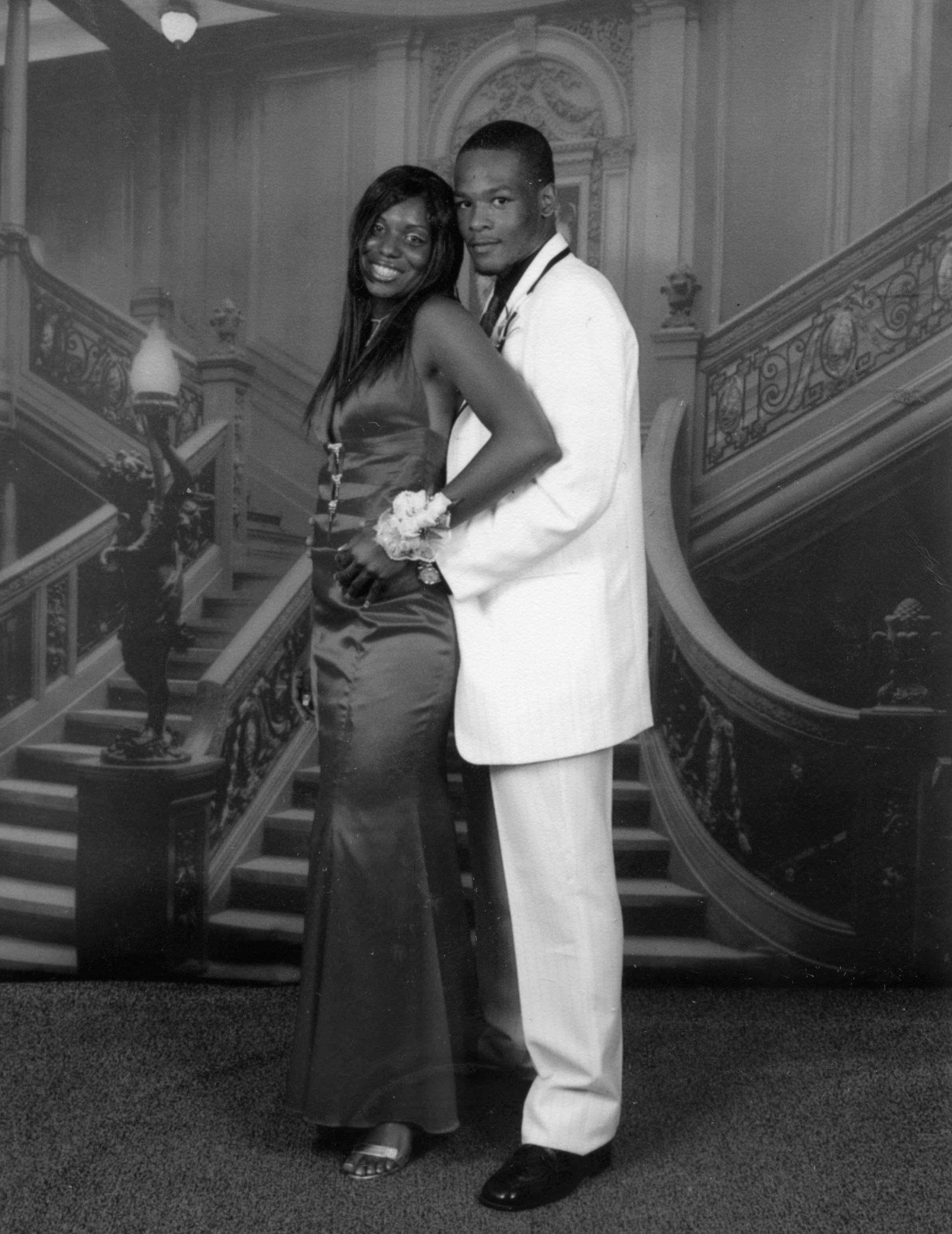
Andre Pitts with date, Simone

Andre Pitts with date, Simone
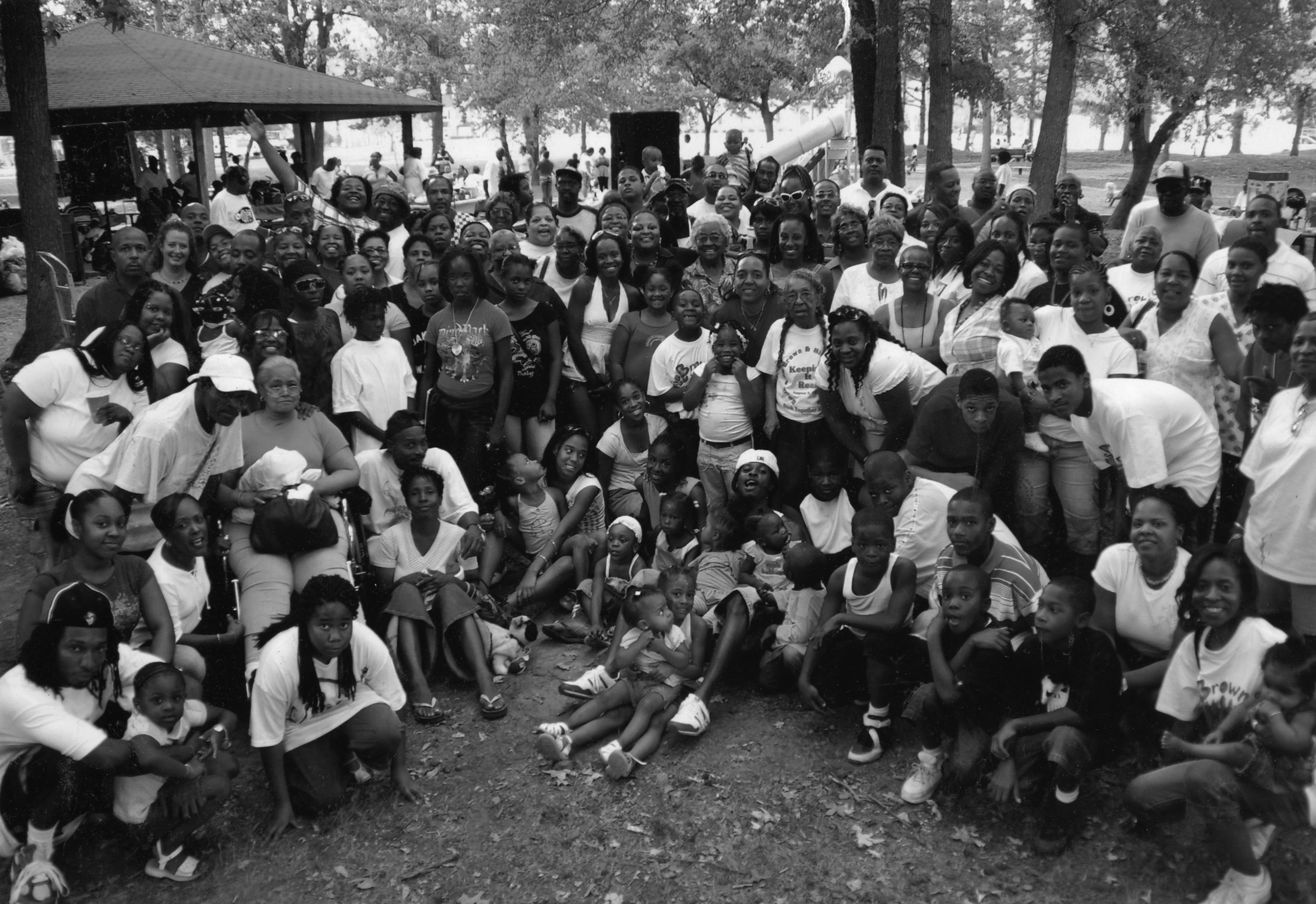
The 2007 Smith family reunion was held in Lakeland Community Park, as it is every other year. In alternate years, the family reunion is held in Pittsburgh, Pennsylvania. Several members of the family continue to live in Lakeland, and many others still consider Lakeland their home. Family members traveled from as far as Texas to attend the 2007 reunion.
An oral history interview conducted with Audrey Scott during Lakeland Heritage Weekend 2007.
This interview of Dervy Lomax by Neil Cohen is one of two interviews Mr. Lomax has given as part of the Lakeland Community Heritage Project's oral history archive. The interview is broken into two parts: basic biographical data about himself and his family and the impact living in Lakeland has had upon him, personally. Dervy Lomax was born December 20, 1923 in Berwyn. He became a part of the Lakeland community when he came to Lakeland for elementary school. Mr. Lomax recalls the community watching out for his wellbeing, when neighbors told his parents of his misadventures with a well/spring in an empty field on his route to school. Dervy Lomax married a woman named Thelma in 1953 at First Baptist Church in College Park. They remain married at the time of the interview. Mr. Lomax recalls competing for Thelma's hand with a man who would be the best man at Thelma and Dervy's wedding. When she felt he was taking too much time to propose, an aunt pressured him not to be too choosy or to wait too long. The couple has two sons, Gregory Lomax, born March 6, 1954 and Elson Lomax, born November 28, 1956. Mr. Lomax's parents were Etelka Johnson and Charles Lomax, both born in 1902. Etelka was born and lived in Lakeland all her life. Her parents were Blanche and Charles Johnson, of Bladensburg and Lakeland, respectively. Charles Lomax was born in Muirkirk and grew up in Berwyn Heights. His mother was Henrietta Lomax and she and her husband lived in Muirkirk. As a member of the Lakeland Community, Mr. Lomax was involved with the E.L.K.S. and American Legion, as well as being President of the County Boys Club and Serving on the City Boys Club. He is also a long-standing member of the First Baptist Church of College Park. During high school Dervy Lomax was a pitcher on the school baseball team. When he joined the Navy after graduating from high school, Mr. Lomax continued to play. Once he returned to Lakeland, he joined the community baseball team and recalls his time playing as some of the happiest times in the community. He was so talented and loved by the community that he remembers being urged to pitch in games when he was not even scheduled to play. Mr. Lomax remembers some of his most disappointing times as a member of the Lakeland community as being connected to his involvement in local politics. Starting in 1956, just after he returned from the Navy, Mr. Lomax joined Mary (Williams) Holloman in addressing the City Council about the cost of blacktop on Navahoe Street. Mr. Lomax (who was acting as spokesman for Lakeland) was asked if he was a registered voter and, because of his recent service, he was not, so his concerns were not heard by the Council. He ran for Council in 1957 and was elected. During his time serving on the council, Mr. Lomax emphasizes that he demanded respect and gave respect to his peers in return. Despite respecting one another, the Council continued to avoid addressing his concerns through their votes, whenever possible. The proudest accomplishments in Dervy Lomax's life both centered around education of Lakeland youth. First, he played a large part in getting a school in Lakeland after the old school was earmarked as a school for slow learners, a tactic often employed to remove schools for colored children. Committees of black communities were organized along the Route 1 corridor to discuss where the new school should be built, but the school board also held a non-disclosed, whites only meeting in which they decided to build the new school in Berwyn. Because Mr. Lomax was informed of this meeting by his white friends, he was able to address the school board about their misconduct when they held the official meeting in which all communities were present. As a result, the Superintendent of schools agreed that the school should be in Lakeland. Mr. Lomax also appealed to the State Board of Education for integrated schools while his oldest son was entering high school. During the appeal, colored students were being bussed to Fairmont Heights School from College Park, but Gregory was taught by a private tutor, in order to keep his education on track without compromising Mr. Lomax's appeal. The Lomax's won the appeal and Gregory was allowed to choose between Fairmont and College Park High Schools the following year. He attended College Park. The interview continues with Dervy Lomax addressing various influences in his life. He starts by sharing that religion allowed him to successfully work with the public without being negatively influenced by the lack of personal respect that often accompanied his interactions. For example, when Mr. Lomax was successful in petitioning for code enforcement in Lakeland, many of the landlords in Lakeland were unhappy with him. His faith allowed him to grapple with the dilemmas of doing what was best for his community even when members of his community were unhappy with him. Religion also allowed him to overcome the dishonesty he encountered on the City Council. Finally, religion played a role in his ability to deal with Urban Renewal. A further discussion of Urban Renewal in Lakeland will be available in a later interview, according to this recording. Dervy Lomax was also influenced by two important people in his life. Charles Johnson, his grandfather, was a politically oriented person who kept track of current events. Mr. Lomax spent time discussing these events with his grandfather and even listened to the bombing of Pearl Harbor, live on the radio, with Mr. Johnson. From this relationship, Mr. Lomax developed an interest in politics. Mr. Lomax's mother imparted on him the belief that education was important. He attributes his beliefs, "you have to be educated to do something in this world" and "If you don't have nothing up in your head, you don't have nothing in your pocket" to his mother. The subject of Urban Renewal in Lakeland is revisited again, briefly, as being the event to have caused the most significant change in the community. Mr. Lomax expresses disappointment that many families did not return to live in the new houses that were built after Urban Renewal, despite the input they had in the rebuilding process. He also expresses regret that older members of the community are now selling their homes to owners who rent them to college students. Students do not respect the community and the community is deteriorating as a result. The most important events to impact Dervy Lomax's life are his marriage of 54 years and raising his two sons. He wishes his sons would marry and run for office, following in his footsteps. He also wishes for grandchildren. When asked about special childhood memories, Mr. Lomax returns to his memories of sports in the community. During his childhood, Lakeland was divided geographically, into the Southwest, Railroad Bulldogs, and Babyland areas of the community. Teams would form according to these divisions to play all sorts of games (football, baseball, horseshoes, etc). Mr. Lomax also fondly recalls lawn parties being held by local churches and lakes freezing during the winter and being used as skating rinks for the community and the university students. Those same lakes were used for swimming during the summer. At the close of the interview, Dervy Lomax states that he hopes the community will remember him as dedicated to Lakeland and that he will continue to fight for them as long as I have breath in my body".
An oral history interview conducted with Dervy Lomax by Eli Pousson as part of an IMPART funded oral history research project.

Prom dates
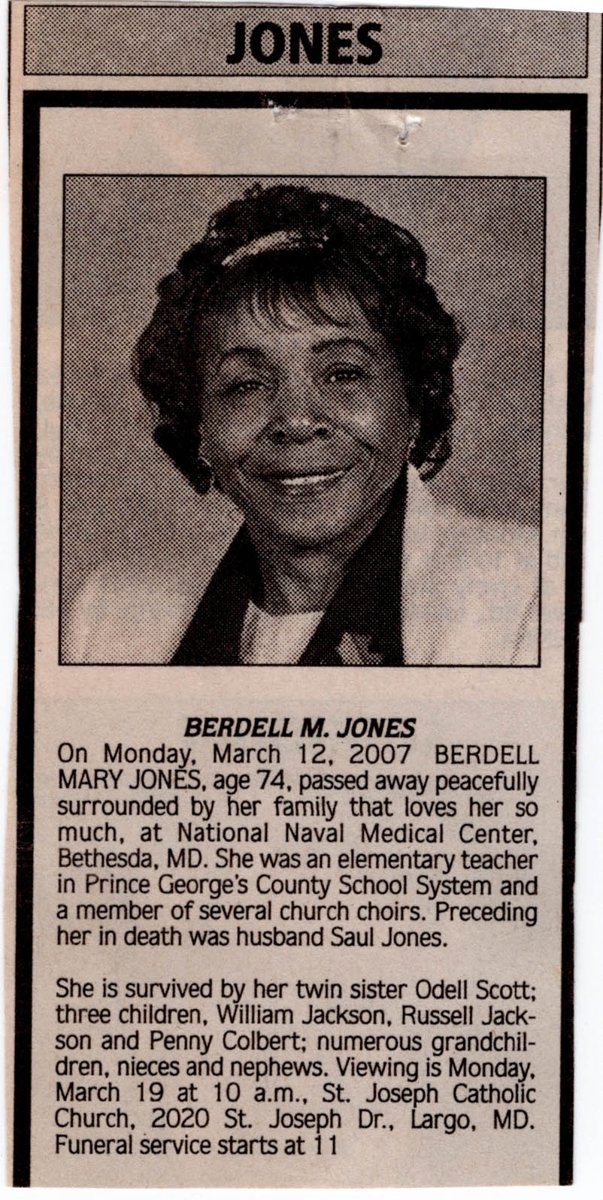
Berdell Mary Jones passed on March 12, 2007, at the age of 74, at the National Naval Medical Center in Bethesda Maryland. In her passing, she left behind beloved family and friends. Details of her service are included in the clipping.
An oral history interview conducted with Leonard Smith in his home, by Eli Pousson as part of an IMPART funded oral history research project.
An oral history interview conducted with Mrs.Mary Hollomand by Eli Pousson as part of an IMPART funded oral history research project.
An oral history interview conducted with Jeanette Brooks during Lakeland Heritage Weekend 2007.
An oral history interview conducted with Jerome Anzulovic during Lakeland Heritage Weekend 2007.
An oral history interview conducted with Elizabeth Adams at her home during Lakeland Heritage Weekend 2007. She lives in Lakeland. Her grandparents and mother moved to Maryland from Washington, DC. She was born on August 4, 1927. Elizabeth was married twice, first to Maseo Campbell in 1944, who moved to Lakeland from upper Marlboro, and again in 1975 to James Adams, whom she met in Lakeland. Elizabeth recalled the dates of her children. At first she mentioned "four girls and two boys," but five daughters are named. All seven of her children were from the first marriage: Pearl Lee, born in 1943 Bertha, born in 1945 Mary Ann, born in 1947 Maseo, born in 1948 Kathleeen Elizabeth, born in 1950 Dennis W. and Jennifer Lorraine Her mother, Ethel Hicks, was a resident of Washington, DC at the time of Elizabeth's birth. She had remarried Benjamin Waites, the stepfather to Elizabeth. Elizabeth made no mention of her natural father. Elizabeth's most vivid memory is of her grandmother, Annie Hicks of Merrifield, VA. Grandma Hicks, as she is remembered, largely raised the young Elizabeth while her mother worked. Elizabeth's maternal grandfather, Benjamin Hicks, came from Calvert County, MD. Although Elizabeth has played an active role in the Lakeland Community Heritage Project, she did not go into much detail about her activities with the organization. She is a proud and active member of Embry AME Church and knows the Reverend quite well. She takes part in Martin Luther King memorial celebrations each year and belongs to the Laity Organization. Her fondest memories are of family picnics with everyone together. Her worst memory was of the torrential flood that hit Lakeland in the 1950s. Maseo had passed on and Elizabeth was alone with three children. She described the waters rushing through the streets. At one point she recalls that it looked like the four of them would have to climb onto the roof for safety. The house had no basement, so water gushed through the windows and doors, quickly filling the rooms. Elizabeth was proud of the fact that she had lived in the same house all her years at Lakeland. In 1947, shortly after their wedding, Maseo gave up his trailer and built a home on the same lot along Navahoe Street. When asked of her proudest accomplishment, Elizabeth pointed to her position for seventeen years at Albright's Pharmacy, formerly on College Avenue in College Park. She noted how gratifying it was to see houses remodelled and to watch the Lakeland community grow in numbers over the years. Not all the changes to Lakeland, however, were welcome. She regrets how streets had changed - in many cases, not just their names. She mentioned a group of townhouses and community center rising where there had once been private homes. She speaks with deep pride about the James Adams Park, which the mayor named in honor of her deceased husband, who was very active in the Civic Association of Lakeland. As for most Lakelanders, religion has played a pivotal role in Elizabeth's life. She often pariticpates in church programs and loves the new minister, Reverend Jenkins. Grandma Annie had the greatest formative influence on Elizabeth during her adolescence. Elizabeth remembers her as a "wonderful person who always encouraged me to do the right thing." Sunday meals were a focal point for the family, and Grandma would teach Elizabeth the finer points of baking biscuits and cakes, especially as she came into her teens. Elizabeth enjoyed such sports as croquet, volley ball, baseball and roller-skating. As a child, she played dodge ball, hopscotch and hide-and-seek. When it snowed, she would belly-wop on a sleigh or toboggan. Her favorite toys were paper dolls and, as the family could afford it, especially teddy bears. One memory that stuck with Elizabeth was the crossing of the train tracks. So many of her contemporaries were now dead, but she remembers some of them moving across the tracks to the other side of Lakeland, presumably from east to west, as the community became incorporated into College Park. Oddly, as Elizabeth recalled the games she played as a child, this prompted her memory of learning to drive - at the ripe age of 38 - when Maseo poked poles into the pavement and her nephew made her drive around them. What has accounted for her cheery disposition? What is the source of her happiness? Elizabeth had no simple response. It seems that this was how Grandma Annie had lived her life, and hers was a good model to follow.
An oral history interview conducted with Pamela Boardley by Eli Pousson as part of an IMPART funded oral history research project.
An oral history interview conducted with Fannie Douglass during Lakeland Heritage Weekend 2007. Mrs. Fannie Douglas was born on April 15, 1919 in Garner, North Carolina. Her parents were Freeland Winters and Bettie Winters. In 1939, Mrs. Douglas was living in Raleigh, North Carolina with her mother. Her father had passed away by this point. It was here that she met her future husband, James Douglas of Hamlet, North Carolina. After they were married, they moved up to Lakeland and lived with James's aunt. While in Lakeland, Mrs. Douglas did"house work." She referred to this as "day work" and stated that this is really all that women in Lakeland could do at the time. James Douglas was a truck driver. In 1921, Mr. and Mrs. Douglas moved into their own home in Hyattsville, Maryland. They lived there for twelve to eighteen months, before moving back to Lakeland. During World War II, James Douglas went into the army and served there for two and a half years. Mrs. Douglas's most notable community involvement was in the church. She was first a visiting member of First Baptist Church. Currently, she is a member of Embry AME. In her years at Embry, she has served on the Usher Board, has been president of the senior choir, a missionary, and church treasurer. According to Mrs. Douglas, the most disappointing time in Lakeland was the Urban Renewal Project. She stated that she warned community members to not allow them to come in as they would just destroy the community. As a result, many people needed to move out because their homes were destroyed. She also mentions waking up one morning and seeing her yard flooded. While Mrs. Douglas was not specific as to what Lakeland did to make sure this never happened again, she did say that this was the first and last time that Lakeland experienced a flood of this magnitude. Mrs. Douglas currently has one daughter by the name of Betty Wright and one grandson by the name of Robert Clifton Peters, who currently resides with Mrs. Douglas.
An oral history interview conducted with Maxine Gross by Eli Pousson as part of an IMPART funded oral history research project.
An oral history interview conducted with James Edwards during Lakeland Heritage Weekend 2007.
An oral history interview conducted with June King during Lakeland Heritage Weekend 2007.
An oral history interview conducted with Mary Hollomand during Lakeland Heritage Weekend 2007.